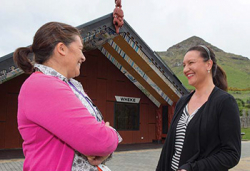Caring for the heart of the hapū

Te Hapū O Ngāti Wheke is the heart of the Rāpaki community, and it’s a heart the hapū are committed to keeping healthy.
The small settlement of Rāpaki sits on the on the shores of Lyttelton Harbour, and is one of four marae-based communities situated on the Banks Peninsula.
Rāpaki Office manager Cushla Dwyer is helping lead the challenge of creating a healthier environment.
‘The health of the environment is a critical component when it comes to the health of our people, and is a big focus for us,’ says Cushla.
‘We want to create a healthy, sustainable community so we can support more of our whānau to live healthy lives here, enjoying the land they’re connected to. Ultimately we want more of our families over here; it’s where we want our young people and whānau to live,’ says Cushla.
‘Over time we want the marae to become more and more self-sufficient and sustainable. It’s great to see that some small changes we’re making beginning to lead to some big differences,’ says Cushla.
An important step towards a more sustainable environment has been the development of six raised gardens at the marae. There are also raised gardens looked after by Kaumātua who live on site. In the future the marae plans to plant a Rongoā garden so they can grow plants used in making traditional Māori medicine.
Canterbury DHB health promoter and Rāpaki hapū member Christina Henderson says the gardens play an important role when it comes to promoting healthy lifestyles.
‘It’s about getting back to basics. You don’t have to go out and buy vegetables, it’s much more satisfying to get out in the gardens and grow them yourself,’ says Christina.
Providing kai to visitors is an important tradition at all marae. Schools and community groups regularly visit Rāpaki and while it is customary that following a pōwhiri visitors are provided with some kai, visitors are no longer given sugary drinks and biscuits. Instead, visitors are provided healthy food options including lots of fruit and vegetables.
‘We’re being really mindful of kai options being offered, trying to reduce or eliminate sugar, and lower the use of added salt,’ says Cushla.
‘It’s wonderful to see the kids' eyes light up when they see the colourful, healthy kai laid out. Watching their curiosity grow while they’re picking away at their kai is great.’
Cushla says she is looking forward to when the gardens can provide nourishment for the many visitors to the marae.
‘It will be great for visitors to see how a small garden bed, when carefully maintained, can feed and nourish the many groups welcomed on the marae each and every day.’
Cushla and General Manager Kopa Lee have also both become Quitcard trained, meaning they can not only suggest people go smokefree, but can support them to do so with nicotine replacement therapy.
‘Anytime you want to give up smoking come and see me, I have all the gear! I am always asking people if they want help to quit; it doesn’t matter if they’re young or a dignitary. I’m here to help!’
A key aspiration for the marae is to be able to access kaimoana (food from the sea). It is hoped that the decommissioning of the pipe pumping wastewater into Governors Bay in 2018 will help create a healthier harbour with more plentiful seafood for the hapū to enjoy.
View the story on the Ministry of Health website here.
Pictured: Health promoter Christina Henderson with Rāpaki office manager Cushla Dwyer.
